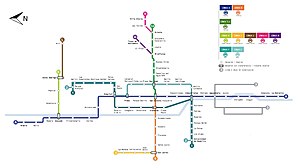Metro de Medellín
 |
|||
 |
|||
| Overview | |||
|---|---|---|---|
| Locale | Medellín, Antioquia, Colombia | ||
| Transit type | Rapid transit | ||
| Number of lines | 2 Metro lines (+ 3 Metrocable lines) |
||
| Number of stations | 27 Metro stations (+ 7 Metrocable stations) |
||
| Daily ridership | 465,387 (2011) | ||
| Website | Metro de Medellín | ||
| Operation | |||
| Began operation | 30 November 1995 | ||
| Operator(s) | Metro de Medellín | ||
| Number of vehicles | 55 | ||
| Technical | |||
| System length | 31.3 km (19.4 mi) 40.7 km (25.3 mi) (w/ Metrocable) |
||
| Track gauge | 1,435 mm (4 ft 8 1⁄2 in) | ||
| Electrification | 1500V DC | ||
|
|||
The Medellín Metro (Spanish: Metro de Medellín) is an urban train that crosses the Metropolitan Area of Medellín from North to South and from Centre to West. It first opened for service on 30 November 1995. As one of the first experiences of modern mass transportation in Colombia and the only metro system in the country, the Medellín Metro is a product of the urban planning of the Antioquia department of Colombia.
The city of Medellín and its urban complex (ten cities in the Aburrá Valley) had a relatively recent industrial development that started in the 1930s. The streetcar (tranvía) at the beginning of the 20th century can be considered as predecessor of the 21st century Medellín Metro. The company known in Spanish as Empresa de Transporte Masivo del Valle de Aburrá - Metro de Medellín Ltda was created on 31 May 1979.
The railway history of Colombia and Antioquia has not been indifferent to the industrialization process that started at the end of the 19th Century and that only has been restrained by the social and political conflicts of this South American nation.
The Antioquia Department and the Paisa Region in general, owe their progress to the construction of railways that had put them in direct contact with the rest of the country (especially with Bogotá, Cali and the Colombian Caribbean Littoral).
Although the famous Antioquia Railway came to a decline and it is now only remembered by the so-called towns of the train, an urban railway system received the attention of the region. In the same way the Antioquia’s Railways did a century ago, the Medellín Metro became an important social, cultural and development axis in one of the most important cities of Colombia and South America.
...
Wikipedia

